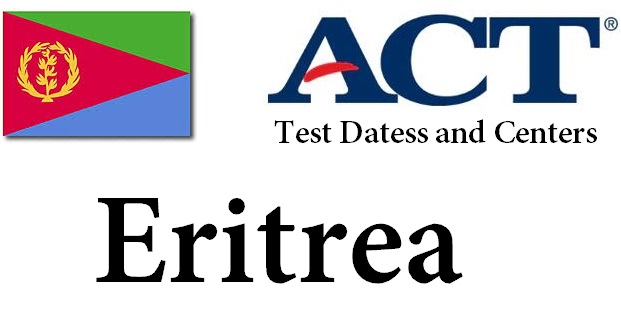Your search found 1 match. The following is the full list of ACT testing locations in Eritrea among which you can pick one to take the exam. Please know that on the test day, test takers can use any 4-function, scientific, or graphing calculator. On the table below, you can also find all test dates through 2019.

2019-2020 ACT Test Dates in Eritrea
| Test Date | Registration Deadline |
| February 9, 2019 | January 11, 2019 |
| April 13, 2019 | March 8, 2019 |
| June 8, 2019 | May 3, 2019 |
| July 13, 2019 | June 14, 2019 |
| September 14, 2019 | August 16, 2019 |
| October 26, 2019 | September 20, 2019 |
| December 14, 2019 | November 8, 2019 |
| February 8, 2020 | January 10, 2020 |
| April 4, 2020 | February 28, 2020 |
| June 13, 2020 | May 8, 2020 |
| July 18, 2020 | June 19, 2020 |
ACT Test Centers in Eritrea
| City | Center Name | Center Code |
| Asmara | Asmara International Comm School | 872410 |
More about Eritrea
Politics
The constitution, passed by the Constituent Assembly on May 23, 1997, designates Eritrea as the presidential republic. However, implementation of the constitution was suspended when the war with Ethiopia began in 1998 and largely canceled in 2001. Head of State, Chairman of the Council of State (Head of Government), President of Parliament and Commander-in-Chief of the Armed Forces is the President with far-reaching powers (elected by Parliament for 5 years, re-election possible once); However, no elections have taken place so far. In fact, the President does not govern on the basis of the constitution, but according to the specifications of the unity party PFDJ. He appoints the members of the government, the governors of the provinces and the judges of the Supreme Court and exercises de facto control over the judiciary through special courts. The legislature is supported by the National Assembly, which was formed in 1993 and has acted as a transitional parliament since 1997 (150 members, including 75 members of the Central Council of the PFDJ, 60 representatives of the regions and 15 representatives of Eritreans living abroad). The parliamentary elections planned for 2001 have not yet taken place.
National symbols
The national flag is green over blue with a red triangle from the leech to the flying end. In the triangle an olive branch in gold surrounded by olive branches. The colors of the flag are reminiscent of the Eritrean People’s Liberation Front.
The national coat of arms, officially introduced in 1993, shows a camel on green ground framed by two green olive branches. Below that is the name of the country in Tigrinja, English and Arabic in a blue band in gold letters.
The national holiday is May 24th, it commemorates the achievement of independence in 1993.
Parties
So far the only legal party is the People’s Front for Democracy and Justice (PFDJ), which emerged from the Eritrean People’s Liberation Front (EPLF) in 1994. There are also various opposition parties, most of which are united in the Eritrean Democratic Alliance (EDA).
Unions
One union is the National Confederation of Eritrean Workers (NCEW).
Military
The total strength of the army (16 months of military service) cannot be precisely proven. About 200,000 soldiers are accepted for the army, which is divided into four corps with twenty brigades, 350 for the air force and about 1,400 for the navy.
Administration
Eritrea is divided into 6 regions, which were formed in 1995 from the 9 regions previously oriented towards historical borders. Each region is headed by a governor appointed by the president.
Law
The judiciary is divided into two parts. The highest instance is the Supreme Court, whose judges are appointed by the President. There are also civil courts, military courts and special courts for capital crimes and corruption, for example.
State civil law is based on the Ethiopian civil code, but regional civil law also applies, particularly in matters of inheritance and family law: the Tigrinja-speaking highlands are shaped by legal traditions that partly date back to the 14th century; the Akkele-Guzay area is subject to the Adginna code -Tegeleba, for parts of the Hamasen area the legal books Adkeme-Melga ‘, Loggon-Ch’ewan and Heggi Habsellus Gerekistos, for Muslims the Sharia (Islamic law) and local legal traditions. The criminal law is based on the Ethiopian penal code. Public law is based on the constitution, which has yet to be implemented in legal practice, and on government proclamations.
Education
There is general compulsory schooling from 7 to 14 years of age. The school system is divided into the five-year primary school, the two-year middle school and the four-year secondary school (qualification: university entrance qualification). The secondary school certificate entitles to attend vocational training centers, e.g. B. the three-year technical colleges. In addition to the public schools, which are free to attend, there are private schools that charge tuition fees. The university in Asmara (founded in 1958 as a university institute by an Italian missionary congregation) was replaced in 2006 by various outsourced university institutes and colleges in the course of decentralization.
Media
The entire media sector, including the Internet, is subject to strict state censorship and control. Private media are prohibited. In 2015, the country came last in the ranking of press freedom from Reporters Without Borders.
Press: »Hadas Eritrea« appears daily in Tigrinja and Arabic, as well as the weekly English-language newspaper »Eritrea Profile«.
News agency: “Eritrean News Agency” (Erina, state).
Radio: The state radio broadcaster (“Dimtsi Hafash”, “Radio Zara”) broadcasts programs in eleven languages. The television station »ERI-TV« (founded in 1992) broadcasts programs in Arabic and Tigrinja. Various opposition radio stations broadcast from abroad.

